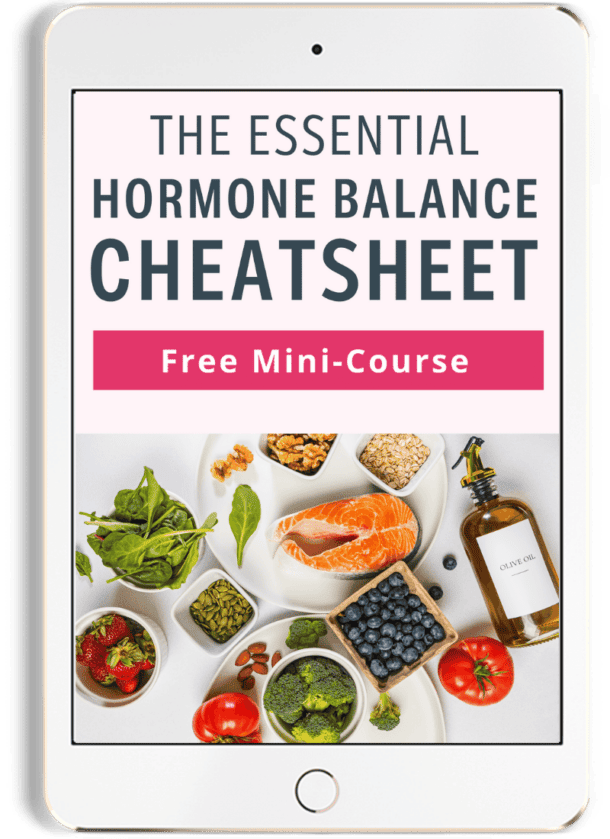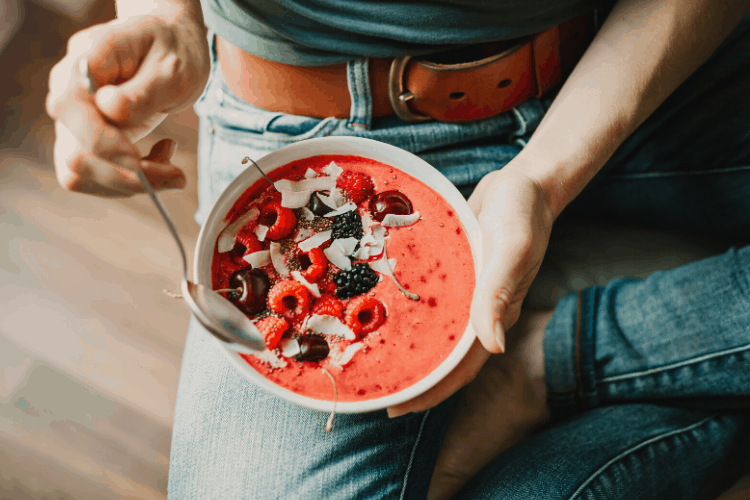
As with every aspect of our health, we can’t ignore the role that food choices can play on egg quality and fertility as a whole.
So, whether you’re just getting started with trying to conceive, or you’ve been trying for a while, this article is going to give you some practical tips for supporting your body on your fertility journey.
By the end of this article, you will have a better understanding of:
- what research is showing about the link between egg health and diet.
- foods that support egg quality.
NOTE: for the full list of research papers and other resources that were used to put together this post, see the “References” section at the end of this article.
CAN YOU DO ANYTHING TO IMPROVE EGG QUALITY?
The biggest factor that determines egg quality is age. And simply put, the older we get, the more egg quality – and egg quantity – goes down (source).
This is just a basic fact of life in terms of how the body is naturally programmed.
Now, having said that, research is showing that there are dietary and lifestyle choices that may help prevent egg quality – and overall fertility – from degrading too quickly (1, 2, 3).
So, from that perspective, you can do something to improve egg quality. And that is what we’re going to look at throughout the rest of this article.
THINGS THAT CONTRIBUTE TO POOR EGG QUALITY
Many of the things that can contribute to poor egg quality are the same things that affect our overall health and well-being.
Some of the top culprits are:
- Emotional Stress: Stress triggers the body’s inflammatory response. This means the adrenal glands release anti-inflammatory hormones like cortisol. If stress levels remain chronically elevated, this can lead to a decrease in GnRH, the hormone that stimulates the pituitary to release FSH (follicle stimulating hormone) and LH (luteinizing hormone). In addition, higher cortisol levels lead to low estradiol production, which may negatively impact egg quality (source). And if that’s not enough, long-term stress contributes to elevated prolactin and lower progesterone.
- Inflammatory foods: not surprisingly, research indicates that inflammatory foods can also affect fertility. More specifically, consuming too many refined carbs, trans fats and added sugars has a negative effect on women’s fertility (source). It’s also worth noting that inflammatory foods trigger the inflammatory response, leading to the same cascade of events listed in the previous point.
- Environmental Toxins: studies are showing that exposure to environmental toxins negatively affects fertility, pregnancy and fetal developments (source). These environmental toxins include things like pesticides and endocrine disrupting compounds. One group of endocrine disruptors to be aware of is pthalates, which are found in plastics. According to one study, both egg and embryo quality are affected by pthalates (source).
DO’s AND DON’Ts FOR A FERTILITY DIET PLAN THAT INCREASES EGG QUALITY
1. DO Start With Whole, Unprocessed and Unrefined Food
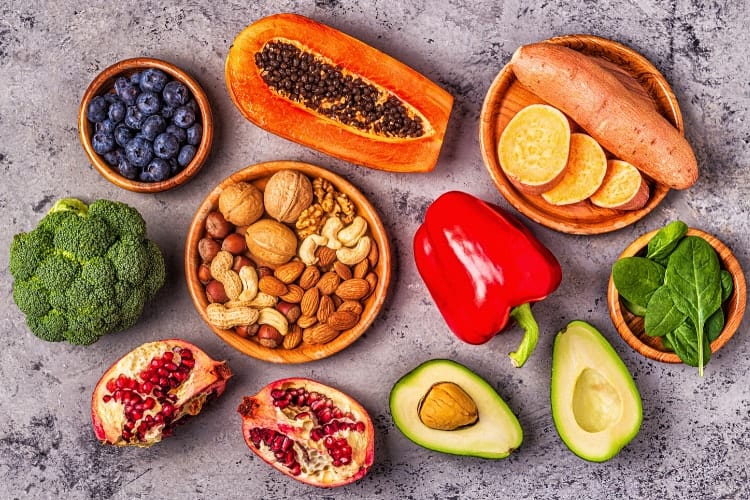
No matter what your health goals are, it comes down to the same boring advice: eat real, whole food.
This means veggies, fruits, legumes, grains, nuts, seeds that are in their whole form.
Also, make sure to eat them in both raw and cooked form because you get different nutritional benefits depending on the state of the food.
Now, you might be wondering how would you eat legumes raw? Well, just sprout them!
So, yes, sprout your chickpeas, red beans and so on.
And by the way, this doesn’t have to be a daily thing.
The whole point is you need a variety of foods. And different food preparation techniques also reduces the chances of you getting bored with the food.
2. DO Eat As Much Organic Food As Possible
Because pesticides and herbicides are estrogen-based, they can seriously mess with our hormones.
So, for the health of your eggs and your soon-to-be little one, eating organic can be a real game-changer.
Now, the thing with eating organic is that it usually brings up two issues: cost and the whole “everyone else is getting pregnant without eating organic” question.
So, let’s address the first thing: cost
Eating organic is not always expensive…unless you buy packaged/premade organic foods (like cookies, granola, cereals, and other convenience foods).
The good thing is packaged foods are on the fertility no-no list, so you don’t have to worry about that!
As for whole food, you simply have to choose wisely in order to keep cost low. And to help you get started I’ve put together this list of 22 tips for how to eat clean on a budget.
Now, let’s address the second thing: why eat organic if others are getting pregnant with conventional food?
As women, we all know that what works for one woman doesn’t always work for the next.
And if you’ve tried different treatments or diets but are not able to conceive, then it’s time to ask yourself: could organic food be the missing ingredient for me?
My point is, you won’t know until you try.
Also, remember that if you really want to get pregnant quickly, then guess what? You have to do more healthy things.
The “shortcut” to a quick pregnancy is to implement more healthy habits.
Yes, it may not be fun but having that bundle of joy in your arms is worth it, right?
3. DON’T Forget to Stay Hydrated

Water is essential for various chemical processes, as well as for hydrating our tissues and flushing out waste.
So, to help your body get rid of any toxins that have built up in your body, make sure to drink plenty of water.
Now, how much water we need varies from one person to another.
Some experts say 8 glasses per day. Others say drink the equivalent of half your body weight in ounces.
There is no one-size-fits all. So be willing to experiment and see what you body truly needs.
4. DO Reach for Wild-Caught Fish
When it comes to meats, fish – specifically the fatty varieties – is considered anti-inflammatory.
This is because fatty has omega-3 fatty acids, which are great for reducing inflammation.
However there are two things to keep in mind when it comes to fish:
- Ideally, buy wild-caught fish instead of farmed fish because there are some concerns around farmed fish. For example, an article from Time Magazine states that there is research showing that consuming farmed salmon once a month can expose us to contaminant levels that exceed the World Health Organization’s safety limits (source).
- Because there are concerns about the mercury levels in wild-caught fish, it’s a good idea not to consume it in excess.
5. DON’T Skimp On Natural Fats
Natural fats are a critical part of egg health because all of our sex hormones are made from fat.
So, eating healthy fats gives your body the raw materials that it needs to keep those hormones in check.
In addition, the walls of our cells are made from fat.
So, whether we’re talking about your gut lining, or the lining of the uterus, all cells need fat for proper function.
This means that foods like coconuts, avocados, eggs, nuts, seeds, ghee and butter should be a regular part of your fertility boosting diet.
6. DO Consume Organic, Fermented Soy
As I already mentioned, unfermented and GMO soy is a no-no.
So, if you want to eat soy products, they must be organic and fermented.
Examples of fermented soy foods are:
- Natto
- Tempeh
- Miso
- Tamari sauce (this is a fermented soy sauce)
7. DO Consume Pasture-Raised Eggs
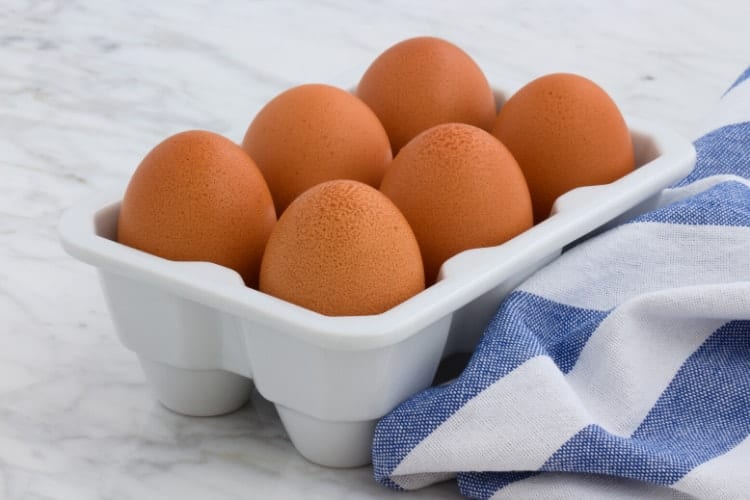
Eggs are full of omega-3 fatty acids, iron, vitamin A, folate, selenium, antioxidants like (lutein and zeaxanthin) and lots of other good stuff!
However, the quality of the eggs depends entirely on the health of the chicken (very much like us humans!).
So, this means that you want to stay away from chickens that were raised in cages (they get no sun, exercise or fresh air), as well as chickens that were given GMO food, hormones and antibiotics.
Instead, when buying eggs for your fertility diet, they must meet meet all of these requirements:
- organic
- hormone-free
- antibiotic-free
- pasture raised (or free range if you can’t find pasture raised)
8. DO Add Nourishing Teas to Your Fertility Meal Plan
Red raspberry leaf, oatstraw and nettle are 3 teas that every woman should have close by throughout her entire life.
Let’s have a look at what makes these teas beneficial for hormones, egg health and fertility.
Red Raspberry
- Rich in antioxidants that protect cells from damage (such as the damage caused by inflammation).
- Good source of vitamins B and C, as well as iron, zinc and magnesium…all of which play important roles in reproductive health.
- Has a particular affinity for women’s reproductive organs and is a go-to women’s herb for all phases of life.
Oatstraw
- A nervine herb (i.e. acts on the nervous system) which means it nourishes the nerves, and creates a sense of relaxation.
- Supports the body’s response to stress, which is good for your adrenals (and indirectly, for the reproductive system).
- Contains proteins, B vitamins, vitamin E.
Nettle
- Natural anti-inflammatory herb that also helps with anemia, liver function, blood sugar regulation and thyroid health.
- Contains iron, vitamin K, vitamin C, fatty acids, various minerals and proteins.
These 3 teas are definitely worth including in your rotation.
Quick note: you can learn more about nettle in this post on the benefits of nettle for hormones.
9. DON’T Forget About Fertility-Friendly Juices and Smoothies
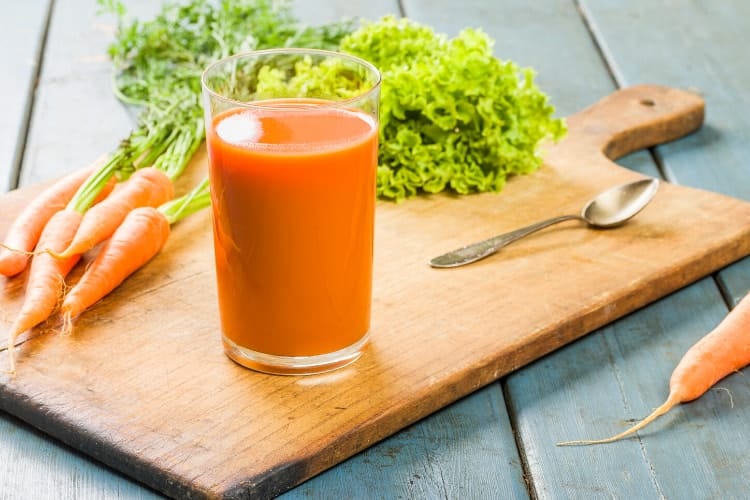
Whenever there’s inflammation and we’re trying to rebuild the body, it becomes double important to drink your nutrients.
This is because taking in liquids is much easier on the digestive system.
And the two best things you can drink are juices and smoothies.
Now, can you get away with just one? Sure.
But will drinking both give you better and faster results. Oh yeah!
Here’s the main difference between juices and smoothies:
- Juices don’t contain the fiber that was originally in the fruits/veggies. It’s pure nutrients (vitamins, minerals, antioxidants and so on). It’s a super concentrated form of nutrients. It’s like a supplement but better because it’s living food. And since it has no fiber, it doesn’t put any strain on the gut or digestive system.
- Smoothies do contain fiber. However, since they’re in liquid form, it’s gentler on your digestive system.
Adding both of these to your diet allows you to get nutrients and support detoxification, while allowing your gut, liver and other systems in the body to recover from stress and inflammation.
10. DO Support Your Gut With Prebiotics and Probiotics
In a previous post on gut health and hormones, I talked about the fact that the gut affects every single hormone in the body.
This is because the gut either produces hormones and/or participates in a process that leads to the production of hormones.
So, it’s essential that your fertility diet includes both pre- and probiotics for gut health.
What’s the difference between the two?
Well, prebiotics are soluble fiber that is found in our food (whole foods like fruits, veggies, grains, legumes).
That soluble fiber feeds your gut bacteria so that they can multiply.
As for probiotics those are live bacteria that comes from fermented foods.
Eating these foods gives you direct access to various bacterial strains that colonize your gut.
For the best results, your diet should include both types of “biotics.”
FOODS THAT IMPROVE EGG QUALITY AND FERTILITY NATURALLY
So, we’ve covered the basic guidelines of what to eat and what not to eat.
Now it’s time to break down each category of food so you know what to include in your grocery list.
Please note that the list below isn’t exhaustive. It’s just meant to give you a starting point.
Feel free to adapt and tweak to your liking!
Legumes
- beans (for example red, black, lima, pinto, beans)
- chickpeas
- lentils
- peas
Fruits
All fresh or frozen, whole fruits are beneficial for fertility.
This list below is just a sample of what you can eat. Ultimately, go with what’s in season or locally available in your region.
- figs
- raspberries
- strawberries
- blueberries
- blackberries
- dates
- watermelon
- peaches
- mangoes
- bananas
- pineapples
- tomatoes
- avocados
- pomegranates
- lemons
- limes
- oranges
- apples
- cherries
Vegetables
Just like with fruits, all vegetables should be included in your diet.
However, pay particular attention to leafy greens: you should consume them every day because they are packed with nutrients.
And at least two meals per day should include some type of veggie.
Examples of veggies to include in your diet (this is not a complete list – choose what’s available to you):
- cabbage
- cauliflower
- dandelion greens
- mustard greens
- broccoli
- kale
- radishes
- bok choy
- collard greens
- mustard greens
- brussel sprouts
- garden cress
- cucumbers
- arugula
- spinac
- carrots
- celery
- asparagus
- endives
- green beans
- peas
- squash
- eggplant
- tomatoes
- carrots
- artichokes
Gluten-Free Grains
- quinoa
- rice (all types)
- amaranth
- buckwheat
- teff
- millet
- oats
- corn (must be organic because most corn is gmo)
- sorghum
- spelt
Nuts and Seeds
- peanuts
- walnuts
- almonds
- macadamias
- cashews
- sunflower seeds
- pumpkin seeds
- chia seeds
- flax seeds
- sesame seeds
Fatty Fish
- salmon
- sardines
- mackerel
- seabass
- trout
Sweeteners
- raw honey
- maple syrup
- blackstrap molasses
- dried green stevia leaf or green stevia powder
Baking Flours
- brown rice flour
- almond flour
- garbanzo flour
- coconut flour
- spelt flour
- buckwheat flour
Oils
- avocado oils
- coconut oil
- grapeseed oil
- olive oil
- sesame oil
- ghee and butter (organic, grass-fed, hormone-free, antibiotic-free)
- hemp seed oil
- palm oil
Milks
Choose from plant-based milks like:
- rice milk
- almond milk
- oat milk
- cashew milk
- macadamia nut milk
Herbs and Spices
Herbs and spices are full of antioxidants, minerals, vitamins and many anti-inflammatory compounds.
So, be sure to incorporate as many as you like into your cooking!
A few to consider are:
- turmeric
- pink salt
- celtic sea salt
- mint
- cinnamon
- cayenne pepper
- cloves
- ginger
- cardamom
- rosemary
- oregano
- cilantro
- parsley
- thyme
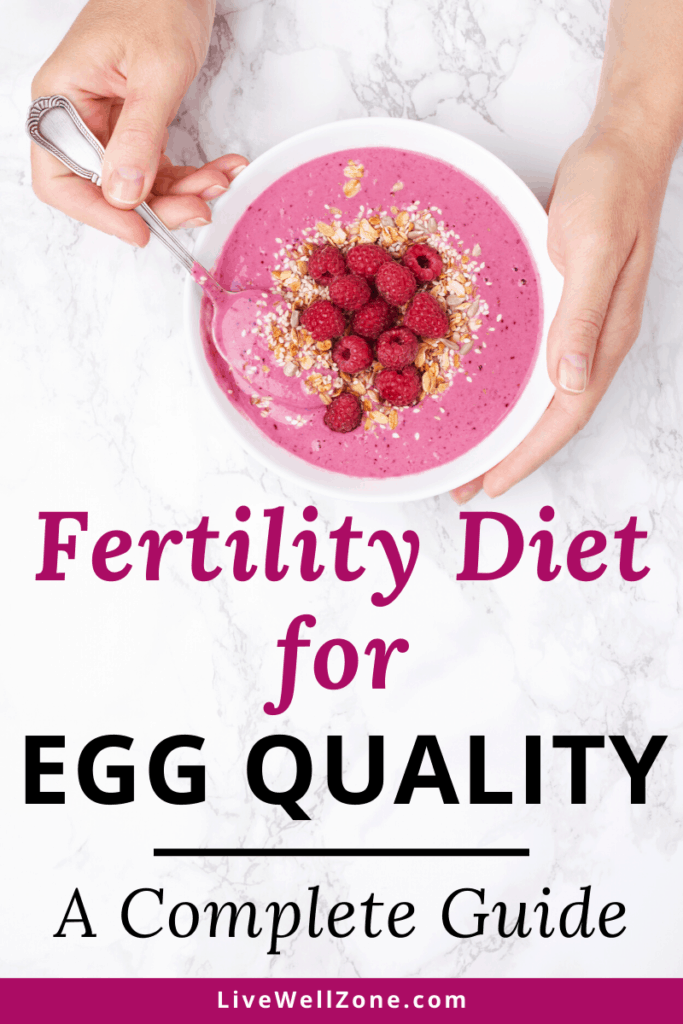
HOW CAN I IMPROVE MY EGG QUALITY AFTER 40?
Even though egg quality, and the quantity of viable eggs, naturally declines with age, it doesn’t have to be a steep decline.
And the truth is, improving your egg quality when you’re over 40 still boils down to the basic principles we’ve already covered: keep stress and inflammation low.
So, stick to the clean eating principles we’ve covered in this article.
And pay attention to other areas of your life that might be a source of stress.
Then find ways to manage your reaction to stress. This could be breathing exercises, meditation, mindfulness practice and gentle exercise.
Overall, the key is to remember that while age plays a role, your level of commitment to taking care of yourself matters a lot too.
RELATED QUESTIONS
Can you get pregnant with low quality eggs?
While it’s possible to get pregnant with low quality eggs, the overall chances of succeeding are lower because there are less viable eggs to choose from.
And if you are able to get pregnant with low quality eggs, there’s a greater risk of miscarriage or developmental problems because the egg wasn’t healthy to begin with.
Does folic acid improve egg quality?
Folic acid supports various processes leading up to fertilization and implantation, and is also necessary for a healthy pregnancy (particularly the baby’s development).
So, making sure that you have enough folate in your diet is just one of many things that can help improve the health of your eggs.
CONCLUSION: CAN YOU REVERSE POOR EGG QUALITY?
It takes approximately 90 days for an egg to fully develop. So, this means that if you start eating healthy today and you stick with it for at least 90 days, you will be improving the quality of future eggs.
I hope that this post was helpful in giving you an understanding of what affects egg health and the power you have to change it through food.
Also, keep in mind that supplementation is another important aspect of egg health. And I’ll be covering that in another article, so be sure to stay tuned 🙂
In the meantime, if you have questions or comments about this topic, feel free to leave your feedback below.
Related Posts:
5 Natural Alternatives to Clomid
Vitex vs Inositol: Benefits | Differences | Which is Better for PCOS and More
Maca Fertility Smoothie: Benefits, Best Type To Use and Recipe Tips
Vitex Vs. Clomid for Pregnancy: Pros & Cons, Success Rates, Side Effects and More
How to Make a Fertility Smoothie for PCOS
7 Steps to Get Rid of PCOS Symptoms Naturally
References:
https://www.sciencedaily.com/releases/2009/06/090615171618.htm
https://www.ncbi.nlm.nih.gov/pmc/articles/PMC4307809/
https://www.ucsfhealth.org/education/the-menstrual-cycle
https://www.centerforhumanreprod.com/dor/improve-egg-quality/
https://www.doh.wa.gov/CommunityandEnvironment/Food/Fish/ContaminantsinFish
https://www.healthline.com/nutrition/red-raspberry-leaf-tea
https://theherbalacademy.com/how-to-have-a-sensational-experience-with-oatstraw/
https://www.centerforhumanreprod.com/dor/diminished-ovarian-reserve/
https://www.cdc.gov/drugresistance/food.html
https://www.ewg.org/enviroblog/2016/09/5-ways-protect-your-hormones-toxic-chemicals
https://www.webmd.com/diet/features/safer-food-healthier-you

